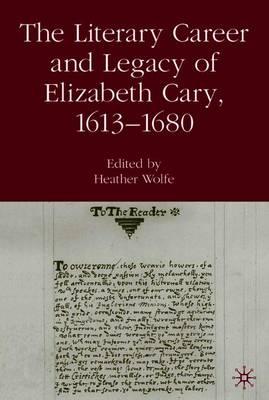Overview
This is the first book to study the work and influence of Elizabeth Cary, author of the first original play by a woman to be printed in English, The Tragedyie of Mariam (1613). Previous criticism focused concentrated on this and The History of Edward II , this volume incorporates critical and historical analyses of other genres too.
Full Product Details
Author: H. Wolfe
Publisher: Palgrave USA
Imprint: Palgrave Macmillan
Edition: 2007 ed.
Dimensions:
Width: 14.00cm
, Height: 2.10cm
, Length: 21.60cm
Weight: 0.505kg
ISBN: 9781403970169
ISBN 10: 1403970165
Pages: 261
Publication Date: 23 February 2007
Audience:
Professional and scholarly
,
College/higher education
,
Professional & Vocational
,
Undergraduate
Format: Hardback
Publisher's Status: Active
Availability: Out of print, replaced by POD

We will order this item for you from a manufatured on demand supplier.
Reviews
This is a splendid collection of essays, treating the entire range of Elizabeth Cary's writing and its literary, political, and religious resonances and affiliations. Several essays offer new critical perspectives on Cary's closet drama, The Tragedy of Mariam, and others explore the relations between and political import of the two printed versions of her The History of Edward II and the two recently discovered manuscripts of that work. Some essays treat her translation of the Roman Catholic controversalist Du Perron and her epitaph (and elegy?) on the assassination of Buckingham, works which involved her directly with fraught contemporary issues. Still others treat her private letters, her patronage of writers and Irish social projects, her association with court and intellectual circles, and her influence on the writings of her children. The collection significantly advances our knowledge of Cary and her age, as well as testifying to the maturity the study of early modern women'
This is a splendid collection of essays, treating the entire range of Elizabeth Cary's writing and its literary, political, and religious resonances and affiliations. Several essays offer new critical perspectives on Cary's closet drama, The Tragedy of Mariam , and others explore the relations between and political import of the two printed versions of her The History of Edward II and the two recently discovered manuscripts of that work. Some essays treat her translation of the Roman Catholic controversalist Du Perron and her epitaph (and elegy?) on the assassination of Buckingham, works which involved her directly with fraught contemporary issues. Still others treat her private letters, her patronage of writers and Irish social projects, her association with court and intellectual circles, and her influence on the writings of her children. The collection significantly advances our knowledge of Cary and her age, as well as testifying to the maturity the study of early modern women's writing has now attained. --Barbara Lewalski, Kenan Professor of English Literature, Harvard University
This is a splendid collection of essays, treating the entire range of Elizabeth Cary's writing and its literary, political, and religious resonances and affiliations. Several essays offer new critical perspectives on Cary's closet drama, The Tragedy of Mariam, and others explore the relations between and political import of the two printed versions of her The History of Edward II and the two recently discovered manuscripts of that work. Some essays treat her translation of the Roman Catholic controversalist Du Perron and her epitaph (and elegy?) on the assassination of Buckingham, works which involved her directly with fraught contemporary issues. Still others treat her private letters, her patronage of writers and Irish social projects, her association with court and intellectual circles, and her influence on the writings of her children. The collection significantly advances our knowledge of Cary and her age, as well as testifying to the maturity the study of early modern women's writing has now attained. --Barbara Lewalski, Kenan Professor of English Literature, Harvard University<br>
Author Information
HEATHER WOLFE is a distinguished scholar and the Curator of Manuscripts, Folger Shakespeare Library, USA.



